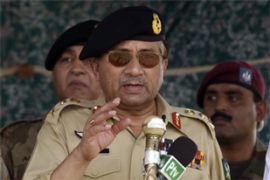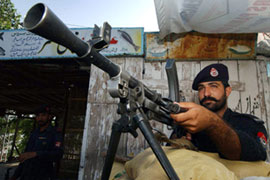Pakistan to impose ’emergency rule’
Musharraf is considering the move due to “external and internal threats”.

Published On 9 Aug 2007
“The president will chair a meeting to decide about a state of emergency in the country,” a source who asked not to be named told AFP.
|
|
Another senior government official who also requested anonymity said Musharraf had already held several meetings on Wednesday with Shaukat Aziz, the prime minister, legal experts and senior members of the ruling party.
Azim said a state of emergency was being discussed because of “some external and internal threats and the law and order situation”, referring to recent military action against fighters in the northwestern border areas that he said had resulted in the deaths of many soldiers.
During a state of emergency, the government can restrict the freedom to move, rally, engage in political activities or form groups as well as take a slew of other measures, including restricting the parliament’s right to make laws.
It can even dissolve parliament.
Under Pakistan’s constitution, the president may declare a state of emergency if it is deemed that the country’s security is “threatened by war or external aggression, or by internal disturbance beyond” the government’s authority to control.
If a state of emergency is to be extended beyond two months, it must be approved by a joint sitting of parliament, the constitution says.
Kamal Hyder, Al Jazeera’s correspondent in Pakistan, said the state of emergency would give the government greater control and suspend rights such as to free speech.
No show
 |
| State of emergency will give the government greater control and suspend rights [AFP] |
Earlier on Wednesday, Musharraf pulled out of a peace meeting with tribal elders in Afghanistan.
The president told Hamid Karzai, his Afghan counterpart, that he would send his prime minister in his place.
The council meeting was to start on Thursday and had been brokered by the US president.
A US state department official speaking on condition of anonymity initially said the Bush administration was surprised and dismayed by Musharraf’s pullout.
But Sean McCormack, the department’s spokesman, later said: “President Musharraf certainly wouldn’t stay back in Islamabad if he didn’t believe he had good and compelling reasons to stay back. Certainly we would understand that.”
Source: Al Jazeera, News Agencies